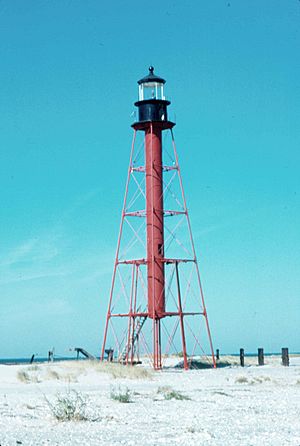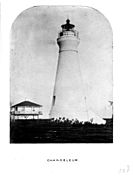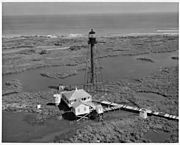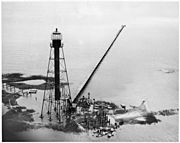Chandeleur Island Light facts for kids
 |
|
| c. 1986 | |
|
|
|
| Location | Chandeleur Islands, Gulf of Mexico, Louisiana |
|---|---|
| Coordinates | 30°2′50″N 88°52′41″W / 30.04722°N 88.87806°W |
| Year first constructed | 1848 |
| Year first lit | 1896 (most recent tower) |
| Automated | 1966 |
| Deactivated | destroyed by Katrina, 2005 |
| Foundation | Pile |
| Construction | Iron |
| Tower shape | Skeletal with cylinder |
| Markings / pattern | Brown with black lantern |
| Focal height | 102 feet (31 m) |
| Original lens | 3rd order Fresnel lens |
| Characteristic | various, most recent: Flashing white |
| Fog signal | none |
The Chandeleur Island Light was a lighthouse that stood near the northern end of the Chandeleur Islands. These islands are located in the Gulf of Mexico, off the east coast of Louisiana. This important light was first built in 1848. Sadly, a powerful storm called Hurricane Katrina completely destroyed the lighthouse in 2005.
History of the Light
The very first lighthouse at this spot was finished in 1848. It had nine lamps that shone from about 55 feet (17 meters) above its base. However, a hurricane in August 1852 destroyed both the tower and the house where the lighthouse keeper lived.
A second lighthouse, made of brick, was ready by 1855. Its light was about 50 feet (15 meters) high. By 1865, it had a special lens called a 4th order Fresnel lens. This type of lens helps make the light much brighter and easier to see from far away. This brick tower was the only building that survived a hurricane on October 1, 1893. Even though it survived, it was badly damaged and had to be taken down. The government then set aside $35,000 to build a new one.
A brand new lighthouse was built in 1895. This one was an iron skeleton tower, meaning it had an open, metal frame. It used a 3rd order Fresnel lens, and its light shone from 102 feet (31 meters) high.
The lighthouse was part of an important legal case that went all the way to the Supreme Court of the United States. A boat carrying fertilizer got stuck near the lighthouse. It was decided that the United States Coast Guard had not properly kept the lighthouse working. The Supreme Court ruled that the United States government was responsible for this. In 1986, the light was added to the National Register of Historic Places, which lists important historical sites.
Over time, the land around the lighthouse began to wash away due to erosion. Eventually, the tower stood alone in the water. The last building nearby, the keeper's house, was destroyed by Hurricane Camille in 1969. The lighthouse tower itself was completely destroyed by Hurricane Katrina in 2005. When a research ship visited the area the next spring, they found no trace of the lighthouse left.
Gallery
See also
 In Spanish: Faro de la Isla Chandeleur para niños
In Spanish: Faro de la Isla Chandeleur para niños
 | Roy Wilkins |
 | John Lewis |
 | Linda Carol Brown |





